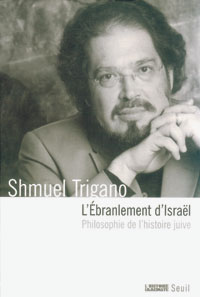In many ways, the events in the Middle East following the second intifada mark a turning point in the history of the Arab-Israeli conflict, but also for the Jewish world. Not in the way that many editorialists would have us believe. The demonization of Zionism promoted by the Durban conference of August-September 2001 and by anti-globalists, and the principled de-legitimization that excludes anything to do with Israel from the political and media discourse, have shown the persistence of archaic stereotypes that were thought to be obsolete. What is going on in this situation, experienced by the Jewish world as the undermining of a symbolic and political order it took for granted? This is what this book seeks to clarify. The author, who makes no secret of his concern, pursues a twofold project: to describe the reality as perceived by Jewish consciousness, and to analyze it by defining what is at stake in such an exclusion. For Shmuel Trigano, the latter is rooted in the “strangeness” that has made the Jewish people, more than Jewish individuals, the outcasts of modernity, the source of endless tragedies, but the bearer of an original message that Israel is called upon to rediscover.

